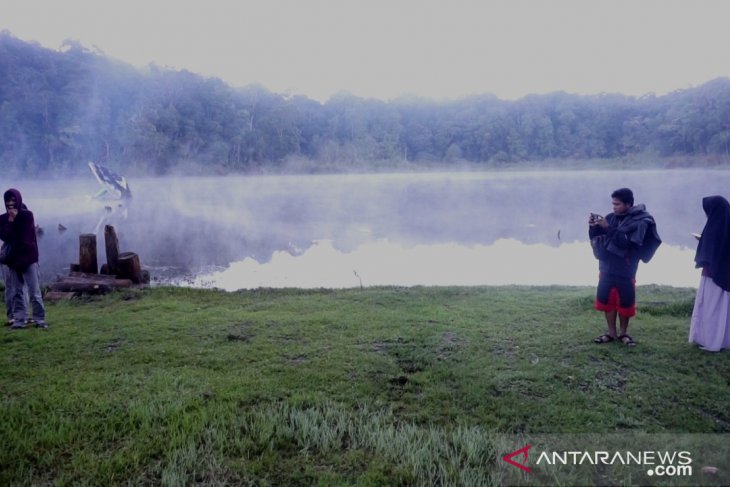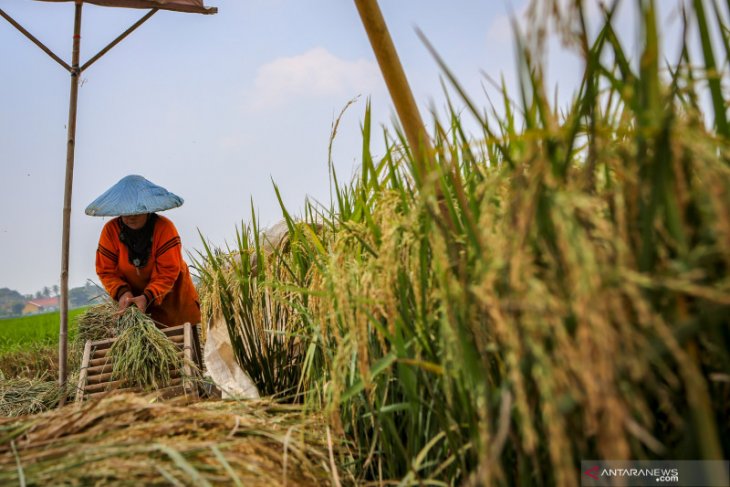Live Streaming
Program Highlight
Company Profile

Ani Hasanah
June
President Joko Widodo Considers Banyuwangi the Most Ready to Face the Pre-Condition of the New Normal
Indonesian President Joko Widodo visited East Java Province to review the region's readiness to face the new normal. The review was conducted, among others, at So Long Tourism Beach in Banyuwangi, East Java, on Thursday (6/25). At this location, the President reviewed the readiness of the tourism sector in entering pre-conditions towards the New Normal. To reporters, President Joko Widodo said that in fact Banyuwangi is the Regency most ready to welcome the new pre-normal conditions.
“I see that in the field Banyuwangi is the area most ready to prepare for a pre-condition to a new normal and the role of local government, the role of the community, I see that the anticipation is very good,” said President Joko Widodo.
President Joko Widodo also appreciated tourism in Banyuwangi which involved the whole community. Three-starred hotels, for example, are all given to the community to manage, while the 4 to 5 starred hotels are given to investors. According to the President a process like this should be emulated by other regions. Thus, when fully opened, the community and especially the tourism sector are ready. (VOI/AHM)
June

Lake Tambing is located in the Lore LIndu National Park in Central Sulawesi. (Antaranews Sulteng/Rangga)
The Lore Lindu National Park (TNLL) Office in Central Sulawesi intends to reopen Lake Tambing for tourists by adhering to stringent health protocols to safeguard against the COVID-19 pandemic in the upcoming new normal era.
"Yes, we plan to reopen it in early July 2020," Head of the TNLL Office Jusman stated in Palu, Central Sulawesi, on Thursday.
According to Jusman, during the past three months that the pandemic has protracted, the major tourist destination in Central Sulawesi was closed temporarily to break the chain of spread of COVID-19 in the province.
The reopening of the main tourist attraction will be coordinated with Central Sulawesi Governor Longki Djanggola, as chairman of the COVID-19 task force in the province.
In line with the COVID-19 health protocols, tourists are required to wear a mask, maintain a safe required distance from one another, and wash hands before entering and leaving the location.
Moreover, only 500 people per week will be allowed entry. Under normal conditions, the number of tourists visiting, including from foreign countries, had reached up to three thousand per week.
The Lake Tambing tourism attraction is located in Sedoa Village, North Lore Sub-district, Poso District, some 90 kilometers from Palu, the capital of Central Sulawesi Province. The lake is situated at 1,700 meters above sea level.
Ecotourism has gained significant popularity among local and foreign tourists, as it has several unique features in terms of both flora and fauna.
The lake is surrounded by a thick tropical rainforest that is home to endemic flora, including leda tree (Eucalyptus deglupta Bl) and black orchids as well as fauna, including deer pigs, anoa, eagles, black monkeys, and pythons.
The facilities in place at the lake enable visitors to observe various species of birds.
TNLL has no less than 270 species of birds, and 30 percent are endemic animals. It is not surprising if the tourist destination is thronged by several foreign tourists, particularly researchers and bird-watchers from across the globe.
"Lake Tambing is also known as a paradise of various bird species," he added. (ANTARA)
Indonesian President Joko Widodo (Jokowi) spoke of being informed of the global economic crisis being a real challenge, and several nations have felt its impacts amid the ongoing global novel coronavirus disease (COVID-19) pandemic.
The International Monetary Fund has forecast that this year, several countries would experience an economic contraction, he remarked on the sidelines of his working visit to witness up-close the COVID-19 mitigation efforts in Surabaya, the capital of East Java Province, on Thursday.
The US economy was projected to contract up to minus eight percent, while those of Japan, the UK, France, Italy, Spain, and Germany would decline to -5.8 percent, -10.2 percent, -12.5 percent, -12.8 percent, - 12.8 percent, and -7.5 percent respectively.
"What does this mean? It means that supply, demand, and production will get disrupted. We must be aware of the fact that while we are handling public health issues, we still reel from the other problem that is the economy," President Jokowi remarked.
Hence, this calls for maintaining a balance in pushing the brake and accelerator pedals in managing the public health and economic crises.
"We cannot push economic matters, but health issues are ignored," he noted.
"In its place, we cannot also focus solely on health issues, but the economy gets disrupted. I have repeatedly informed the regional leaders to push 'the brake and accelerator pedals' in a balanced mode. This is now challenging," he reiterated.
In facing this reality, President Jokowi has urged the nation to have the mental fortitude, as all countries, including Indonesia, are reeling from public health and economic crises owing to the impacts of the ongoing COVID-19 pandemic.
The public health and economic crises, caused by the COVID-19 pandemic, have undoubtedly encumbered several nations.
"The disease has not solely affected Indonesia since it has spread to 215 countries," President Jokowi noted.
To ensure that the country wins the battle against this pandemic, President Jokowi urged all Indonesians to stay sentient of the significance of practicing measures mandated by the healthcare and COVID-19 protocols, including wearing face masks and avoiding crowds.
Hence, the people at large must not misinterpret that since it is the new normal era, so it is unnecessary to wear face masks while venturing outdoors and practice physical distancing measures to break the chain of COVID-19 outbreak.
Coronavirus infections initially surfaced in the Chinese city of Wuhan at the end of 2019.
Since then, COVID-19 has spread to over 215 countries and territories, including 34 provinces of Indonesia, with a massive spurt in death toll.
The Indonesian government officially confirmed the country's first cases on March 2 this year. The COVID-19 pandemic is undeniably a huge crisis in human history. (ANTARA)
June
Indonesian Government should Preemptively Tackle Climate Change Impacts on Rice Yield

A researcher urged Indonesia’s government to take preventive measures against the impact of climate change on the country's stockpiles of rice and other food commodities amid the ongoing global novel coronavirus disease (COVID-19) pandemic.
The extreme drought that Indonesia reeled from in 2019 led to a nearly 7.76 percent decline in the country's rice production, Galuh Octania, a researcher at the Center for Indonesian Policy Studies (CIPS), stated in Jakarta on Thursday.
"Hence, there is an urgent need to take precautionary measures against climate-related uncertainties as they may impact rice absorption during this year's second harvest period that the State Logistics Agency (Bulog) forecast between September and November," he explained.
Referring to the Information Center for Strategic Food Price (PIHPS), the price of a kilogram of rice tends to hover at Rp11,900 since April 2020, he remarked while emphasizing on the need to maintain stability in rice prices across the country.
To this end, Bulog must optimally maintain the distribution of rice stocks across Indonesia to avoid price disparities between regions with rice surplus and those with a deficit, he stressed.
The government is sentient of the importance of boosting the nation's food security amid this ongoing global COVID-19 pandemic and beyond.
On April 21, 2020, President Joko Widodo (Jokowi) had called on officials to ensure that their assessment of Indonesia's rice stocks was accurate.
The president's directive came on the back of a warning issued by the Food and Agriculture Organization (FAO) of the United Nations that forecast the COVID-19 pandemic to trigger a global food crisis.
Speaking in connection with Indonesia's rice stocks, Coordinating Minister for Economic Affairs Airlangga Hartarto has earlier revealed that the country's rice stocks were estimated to reach 4.7 million tons until the end of 2020.
Hartarto informed the press following a virtual limited cabinet meeting chaired by President Joko Widodo (Jokowi) in Jakarta last May that the National Logistics Agency (Bulog) was tasked with maintaining rice stocks of over one million tons.
Hartarto noted that Bulog will absorb 900 thousand to 1.4 million tons of grains of the farmers.
Meanwhile, Minister of Agriculture Syahrul Yasin Limpo noted that the national stocks of 11 commodities were projected to remain safe until June.
The commodities comprise rice, corn, shallots, garlic, large chili, cayenne pepper, beef, buffalo meat, chicken eggs, cooking oil, and granulated sugar. (ANTARA)


